It has been interesting to watch my children during this strange school year of hybrid learning with its mixture of Zoom and in-person classes. The first weeks of school were spent finding our rhythm, and those early days required a not-insignificant amount of my time — checking in to see if the kids were on task, helping them to navigate Google classroom, and stopping my son from turning in blank digital worksheets just to be done sooner.
After that, though, my help was no longer quite so necessary and their breaks were no longer gaping holes in the school day that I had to fill. My kids’ imaginations kicked in and they came up with a slew of new games, activities and non-tuition-based hobbies. Other than missing real-life friends, in many ways they were thriving, which I see as a real testament to how important hobbies can be for children.
Benefits of Hobbies
Kids who regularly engage in a hobby benefit from a reduction in stress and an increase in self-esteem. Hobbies require discipline, patience and perseverance, all character traits which are hard to develop in today’s online, immediate-gratification world. Depending on your child’s chosen hobby, he might also benefit from a boost in physical activity, coordination, and gross and fine motor skills.
Hobbies also productively channel children’s free time, keeping them from potentially destructive or unhealthy habits. This becomes especially important as children get older and have more freedom to make choices about how, and with whom, they spend their time.
If your child hasn’t naturally picked up a hobby, don’t worry. There are many things you can do to encourage her to get involved with something on a deeper level.
Encouraging a Childhood Hobby
- Play the role of interviewer. The first step is to talk to your child about her interests, likes and dislikes. Just talking these things out might spark an idea.
- Take baby steps. If your child is uncertain as to whether he will like something or not, don’t invest in expensive supplies and go all in. Sign up for a summer camp, after school class or a weekend intensive, so your child can see if the hobby is something he’d like to continue.
“Hobbies require discipline, patience and perseverance, all character traits which are hard to develop in today’s online, immediate-gratification world.”
- Don’t live vicariously. This is the time to be careful to keep your thoughts, opinions and interests to yourself. Just because you loved dance as a child doesn’t mean your daughter will too. Until your child has a firm sense of what she’d like to do, keep your excitement about specific activities out of your discussions so you don’t inadvertently apply pressure.
- Join with friends. Having a buddy doing the same thing as your child ramps up the fun while decreasing the stress level. If your child is struggling to come up with a hobby, find out what his friends are doing and ask if he’d like to give one of those activities a try.
Hobbies To Consider
Collecting items such as fossils, rocks, stamps, trading cards, shells or coins helps children work on their focus, research and observational skills. Building a sizeable collection also takes perseverance.
Outdoor hobbies such as hiking, fishing, camping, geocaching, rock climbing, archery and astronomy provide opportunities for healthy physical activity. Participation costs tend to be reasonably priced and outdoor hobbies offer the added benefit of connecting children with nature.
Performing arts such as dance, theater, singing, playing a musical instrument or performing magic offer the opportunity to build confidence. All performing arts also require practice, which helps children to become more disciplined.
Sports offer exercise and health benefits in addition to the opportunity to learn endurance, resilience, dedication, hard work and how to operate as a team. Consider the time and financial requirements of organized sports before joining, but don’t let them scare you away from sports altogether. Kids can find enjoyment in playing, even if they are not part of an organized program.
Technology-related hobbies such as coding, programming, website design and gaming are great for teaching problem solving, logical thinking, persistence, and both independence and collaboration.
Visual arts such as painting, drawing, pottery, sculpting, photography, filmmaking and drawing are wonderful for developing creativity. Many also help to develop fine motor skills.
The main thing to remember is that hobbies are meant to be fun. Your child’s choice of hobby should be inspired by interest and passion and should offer the opportunity to become immersed in joyful activity, leaving the world of homework and childhood worries behind. You may even find that joining your child in her new hobby not only provides a wonderful opportunity for bonding, but has you leaving your cares behind as well.
Alison Bogle is a writer living in Austin with her husband and three children. A former 4th grade teacher, she now enjoys writing about children and education.














